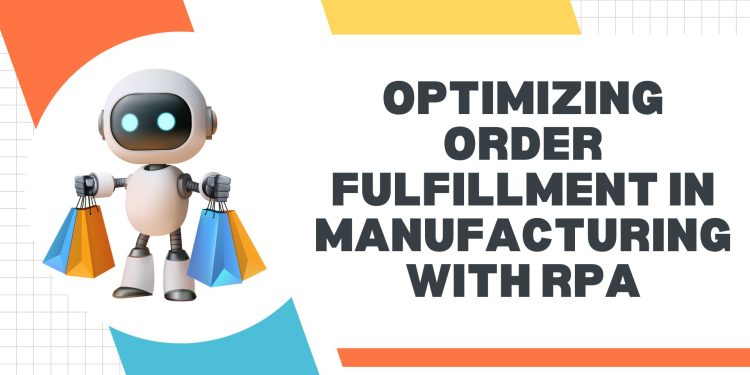With increasing customer demands and a never-ending drive to reduce costs, the manufacturing industry is embracing RPA in manufacturing to optimize its order fulfillment processes. Now, automate inventory checks, create invoices, and control logistics with Robotic Process Automation (RPA) that has changed the definition of efficiency and precision in the manufacturing industry.
This detailed feature article delves into what manufacturers are doing with RPA, supported by data, statistics, real-life examples, and strategic insight.
Why Order Fulfillment requires Digital Revolution
The order fulfillment process in manufacturing is generally not a single step but includes capturing the order, verifying inventory, agreeing on a shipment date, creating an invoice, and handling returns. A lot of this is done using manual and old, customary systems-which leads to:
- Delayed order processing.
- Human errors in data entry.
- High labor costs.
- Poor customer satisfaction.
What RPA in manufacturing does differently is automate repetitive, rules-based tasks, which allows human workers to focus only on those value-added tasks that require a human touch.
RPA Market Size and Adoption in Manufacturing
The size of the global RPA market was estimated to be USD 3.79 billion in 2024 and is projected to reach USD 30.85 billion by 2030, at a CAGR of 43.9%. The manufacturing industry is one of the fastest growing to adopt RPA.
Key stats:
- Firms that have adopted RPA in their distribution and production chains have indicated a 20–30% decrease in operating expenditures.
- The time for processing orders has decreased on average by 60 per cent in automated systems.
- Invoicing has an accuracy rate of over 99% for RPA-assisted systems.
These figures make it clear that RPA is more than a fad – it is quickly becoming top-of-mind in smart manufacturing.
How RPA Streamlines Order Fulfillment
1.Order Capture and Validation
Thus, orders are taken out of your hands: You receive orders, for instance, by mail, Excel files, and e-commerce systems. Bots extract the data from these systems, and you ask them to put the data into the ERP system. They could validate orders immediately concerning inventory availability or price foundations.
- Inventory Verification and Refreshing
RPA bots constantly oversee inventory and issue alerts or refill orders when limits are reached. So that we can avoid stockouts and overstocking.
- Shipment Scheduling and Tracking.
Shipping: RPA can integrate with shipping APIs, auto-create shipping labels, and inform customers with tracking links, without manual touchpoints.
- Invoice Generation and Reconciliation
Invoices automatically generated from the order & shipment data significantly reduce billing errors and speed up account receivable cycles.
- Returns Processing
Bots simplify returns by automating RMAs, updating inventory, and issuing refunds.
Real-World Results from RPA in Manufacturing
One European manufacturer deployed RPA to its order-to-cash process and reduced invoice cycle time by half, representing annual savings of $900,000.
A major global electronics company, for instance, automated its shipping coordination and dropped customer complaints by 40%.
For invoice processing, manufacturers with bots claim to process a number in the 80th-90th % percentile without a human touch.
The Role of RPA Development Services and Businesses
Although RPA has its benefits, it needs the right people who can implement it successfully. This is where RPA development services and reputed RPA companies do wonders. These vendors not only assist with bot design and deployment, but they also handle security, scalability, and compliance.
Here are some Players in the market are:
- RisingMax Inc.: the experts in custom solutions for your complicated manufacturing process.
- SPD Technology: Very expert in terms of scalable RPA architecture with AI integration.
- CIGNEX: Provides end-to-end RPA, with up to 35-50% improvement in productivity on average.
- Bacancy Technology and Matellio: recognized for intelligent automation and bot lifecycle management.
These RPA companies also assist manufacturers in making their operations AI-ready and future-proof to maximize ROI over time.
Enhancing RPA with Custom Chatbots
Alongside RPA, manufacturers are partnering with a custom chatbot development company to enhance real-time communication and customer satisfaction.
These AI chatbots:
- Can offer order status updates 24/7.
- To help your customers with returns or shipping, along with their personalised questions.
- Talk to RPA bots to initiate fulfillment flows using chat.
When RPA and chatbot are integrated, it enables a closed-loop system, and manufacturers can automate back-end operations based on front-end inquiries and optimize speed, precision, and customer satisfaction.
For instance, a chatbot can validate a customer return request while in the background, an RPA bot acts by triggering the RMA, updating inventory, and scheduling pickup in as few as a few seconds.
Best Practices for Implementation
Manufacturers need to follow these best practices to make RPA a success:
1.Start Small, Grow Quickly: Start with high-volume, rule-based activities such as order entry or invoice refilling.
- Establish a Center of Excellence (CoE): A CoE always tries to ensure that the governance, quality control, and constant learning are in flow.
- All about the Change Management: Educate employees and communicate the responsibilities of a bot well in advance so that confusion or pushback does not occur.
- Compliance and Security: Use audit logs, access controls, and encryption to secure data.
- Integrate Wisely: Look for bots that integrate with ERP, CRM, and WMS without disrupting current processes.
Focus Ahead on Manufacturing AI + RPA
The future of order fulfillment is consolidating traditional RPA and new-age AI agents. By incorporating AI models, such as GPT, manufacturers can:
- Catch exceptions and handle them more gracefully.
- Try to understand the fundamentals of unstructured data (such as emails or PDFs).
- Forecast a disruption to the supply chain.
This next-generation automation — often referred to as “agentic AI” — sort of looks beyond rules to take real-time actions, thereby turning factories into more intelligent and agile operations.
Conclusion
For manufacturers, the speed, efficiency, and cost control benefits of RPA are now not optional for order fulfillment. The benefits are transformative—regardless of whether you want to speed up your processing invoice cycle, maintain worldwide uptime, or do away with shipping mistakes, RPA in manufacturing makes them all a reality.
With the assistance of an experienced custom chatbot development company and experienced RPA development services from a reliable provider, manufacturers can create robust, scalable systems for the future. The secret is to select the right RPA companies, begin with a strategic roadmap, and scale intelligently.
Welcome to the era of smarter automation. RPA – Let it automate your order fulfillment to perfection.

















